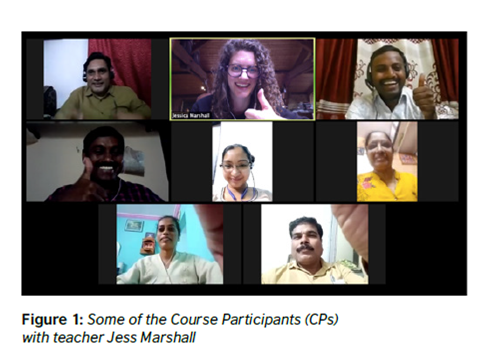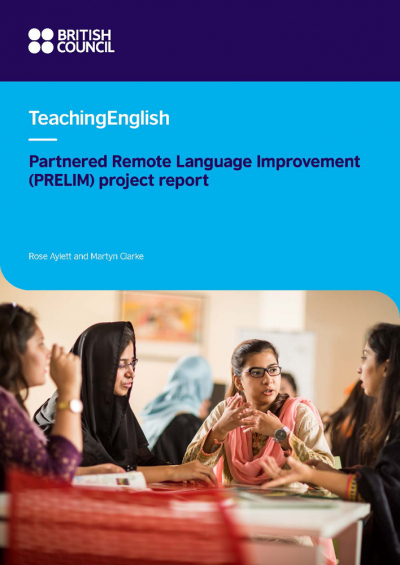Bids are being invited from UK English language schools to help improve the confidence, language and teaching skills of English Teaching Association (ETA) members in 40 nations. The Partnered Remote Learning Improvement Project (PRELIM) is being run for a second time by the British Council, English UK and IATEFL. As with PRELIM 1, NILE are managing consultants for the project.
After the massive success of the original PRELIM in early 2021, the British Council has secured £500,000 funding, enabling twice as many countries and UK language centres to take part.
Roy Cross, the British Council’s Principal Consultant, Partnerships, said:
We’re delighted to be able to offer twice as many - forty - UK schools and universities and teacher associations round the world the opportunity to form a PRELIM partnership this time round. We’re delighted, also, to be able to open up the opportunity this time to up to ten countries not in receipt of official development assistance. There’s lots more learning and development, and lots more new friendships in prospect!
English UK chief executive Jodie Gray added:
We’re very excited to offer our members another chance to join this project, especially while Covid is still having a huge impact on our industry. Those which took part in the first PRELIM were really enthusiastic about the experience, working with teachers in their own countries within the support of a wider community of practice. I’m sure there will be plenty of applications to join PRELIM 2 from not only previous participants but a new group of centres.
As before, each project will be run independently by an English UK member centre with support from NILE to create a community of practice and facilitate the project. Last time, participants included small family-run centres, universities, and a variety of institutions in between.
PRELIM 2 is being launched this week, with the closing date for bids Friday 22 October. Partnerships will deliver between January and March, with the project report likely to be published next June.
IATEFL chief executive Jon Burton affirmed how positive the original PRELIM had been for the teaching associations which had taken part, and looked forward to supporting associations applying for and participating in PRELIM 2.
The fact that this opportunity is being offered to teachers in double the number of countries this time round is wonderful. It can support many excellent teachers within IATEFL's network of associates who might not otherwise have the opportunity to improve their language skills, helping build their confidence to improve their teaching and be more active in their teaching associations.
If you represent a teaching association, you can find out more about the project, and how your teraching association can apply to take part here: https://www.iatefl.org/prelim-2
The first PRELIM, run in 2021
The launch of the new scheme coincides with the publication of a very positive evaluation report on PRELIM I (see below for full report).
This supported the development of over 3,000 English language teachers with partnerships between 17 UK language centres and 20 English Teacher Associations in Official Development Assistance (ODA) countries. It aimed to increase language proficiency and professional confidence, to create and support partnerships between teachers, ETAs and English UK members, and create the opportunity for increased global contextual awareness and teacher training capacity of English UK members and build a sustainable community of practice. “The stories and experiences shared from the PRELIM project participants were moving, rewarding and full of the genuine expression of professional development among all parties, underlining the successful achievement of the aims set out at the inception of the project,” says the report.
It adds that PRELIM had a positive impact on the teachers’ language confidence.
“The opportunity to interact in English outside of the classroom is limited in a number of the contexts of the participating professionals. Indeed, as a participant in Brazil shared, ‘this is the first time I’ve spoken in English with someone’. The creation of an English-speaking online community, even one as relatively short-lived as the PRELIM course, provided the chance to experience communication in a safe environment. For some this had a tangible impact on their classroom practice. A Georgian teacher explained that ‘I try to speak more English during the lesson, I give students instructions in English, I advise them to try to ask their questions in English and if they can’t, I help them to translate their questions’.
“This suggests that on short courses, language confidence is more effectively supported through attitudinal shifts rather than level improvement. In Cameroon, for example, a teacher asserted that ‘I am no more stressed as before; I was scared of making mistakes in front of my students. Thanks to the course, I feel more confident and can teach a whole lesson without using French.’ If this is the case, and the evidence in the reports appears to suggest it is, then the environment of supportive partnership created by the UK institution, the English Teacher Association and the participants has a key role to play in this affective learning.”
The UK participants were delighted to see how their own teachers’ confidence grew. “We have watched them move from teachers to leaders, from teachers with a DoS who knows best, to confident and able teachers who realise that their views, opinions and skills not only matter, but actively improve the course the project is taking,” said LILA* of its collaboration with ThaiTESOL.
Outcomes for the UK language centres included teacher development, new approaches to organisational interactions and use of IT tools and platforms.
“For many of the UK institutions PRELIM provided an opportunity to develop their competence in remote course design and the use of IT tools and platforms. Many of the reports echo the observation that ‘the nature of PRELIM meant our teaching and training staff had to think more deeply about, and become familiar with, many aspects of online learning which they weren’t accustomed to’ (Bell/ ELTA Serbia).”


